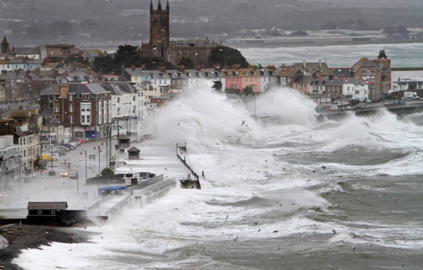PR 00305: verschil tussen versies
Geen bewerkingssamenvatting |
Geen bewerkingssamenvatting |
||
| (15 tussenliggende versies door 2 gebruikers niet weergegeven) | |||
| Regel 1: | Regel 1: | ||
Due to climate change there is a steep increase in sea level rise. This would result in damages caused by flooding in coastal cities unless new strategies are developed in order to mitigate this change in sea level. At this moment coastal flood plans and policies mainly focus on creating traditional hard structures/heavy engineering and make minimal use of nature based solutions, despite the overwhelming evidence of their potential to reduce flood risk and impact. Policy makers often do not consider nature based solutions due to uncertainties around costs, potential for success and maintenance needed after a couple of years. The goal of SARCC is to fill in a gap of knowledge on the topic of nature based solutions, in order to make integration of these types of solutions easier for local authorities and coastal managers to deploy. | |||
[[Bestand:Sarcc.png|miniatuur|423x423px|SARCC will focus on vulnerable coastal cities in the 2Seas region.]] | |||
SARCC will enable the involved partners to embed new techniques, methodologies and practices into coastal management. This will help demonstrate the value of nature based solutions and give opportunity to share gathered information with other stakeholders in coastal urban regions. The project will develop a system to positively engage local communities in the consultations to highlight the value and benefits of nature based solutions to the coastal communities. | |||
Urban areas situated around the North sea and Sustainable and Resilient Coastal Cities (SARCC) is an Interreg 2 Seas program. Within the Interreg 2 Seas region partners of the United Kingdom, France, Belgium and the Netherlands. This international approach will give a platform for sharing ideas and knowledge. | |||
'''Research type:''' field research, desk analysis, lab research | |||
'''Location:''' Vlissingen, Zeeland | |||
'''Contact:''' [https://www.projectenportfolio.nl/wiki/index.php/Gebruiker:Lage0009 Wietse van de Lageweg] | |||
{{Project config}} | {{Project config}} | ||
{{Project | {{Project | ||
|Name=Sustainable and Resilient Coastal Cities (SARCC) | |Name=Sustainable and Resilient Coastal Cities (SARCC) | ||
|Supercontext=Building with Nature | |Supercontext=Building with Nature | ||
|Start date= | |Start date=2017/11/01 | ||
|End date= | |End date=2022/01/31 | ||
|Summary=Sustainable and Resilient Coastal Cities (SARCC) is an Interreg 2 Seas program, this means research is done by various partners in and around the Netherlands. In this project the United kingdom, France and Belgium are involved next to partners in the Netherlands. SARCC focusses on integrating nature-based solutions into coastal management and policy making. This is in the form of stand alone projects, are Nature based solution-hybrids. | |Summary=Sustainable and Resilient Coastal Cities (SARCC) is an Interreg 2 Seas program, this means research is done by various partners in and around the Netherlands. In this project the United kingdom, France and Belgium are involved next to partners in the Netherlands. SARCC focusses on integrating nature-based solutions into coastal management and policy making. This is in the form of stand alone projects, are Nature based solution-hybrids. | ||
| Regel 10: | Regel 21: | ||
|Show summary=Nee | |Show summary=Nee | ||
|Contact person=Gebruiker:Lage0009 | |Contact person=Gebruiker:Lage0009 | ||
|Stakeholder=STKH 00004,STKH 00071, | |Stakeholder=STKH 00004,STKH 00071,STKH 00094,STKH 00096,STKH 00097,STKH 00098,STKH 00099,STKH 00079,STKH 00100,STKH 00101,STKH 00102,STKH 00103,STKH 00104, | ||
|Show extra=Nee | |Show extra=Nee | ||
|Show navigation tree=Ja | |Show navigation tree=Ja | ||
Huidige versie van 6 mei 2020 om 16:14
Due to climate change there is a steep increase in sea level rise. This would result in damages caused by flooding in coastal cities unless new strategies are developed in order to mitigate this change in sea level. At this moment coastal flood plans and policies mainly focus on creating traditional hard structures/heavy engineering and make minimal use of nature based solutions, despite the overwhelming evidence of their potential to reduce flood risk and impact. Policy makers often do not consider nature based solutions due to uncertainties around costs, potential for success and maintenance needed after a couple of years. The goal of SARCC is to fill in a gap of knowledge on the topic of nature based solutions, in order to make integration of these types of solutions easier for local authorities and coastal managers to deploy.
SARCC will enable the involved partners to embed new techniques, methodologies and practices into coastal management. This will help demonstrate the value of nature based solutions and give opportunity to share gathered information with other stakeholders in coastal urban regions. The project will develop a system to positively engage local communities in the consultations to highlight the value and benefits of nature based solutions to the coastal communities.
Urban areas situated around the North sea and Sustainable and Resilient Coastal Cities (SARCC) is an Interreg 2 Seas program. Within the Interreg 2 Seas region partners of the United Kingdom, France, Belgium and the Netherlands. This international approach will give a platform for sharing ideas and knowledge.
Research type: field research, desk analysis, lab research
Location: Vlissingen, Zeeland
Contact: Wietse van de Lageweg

